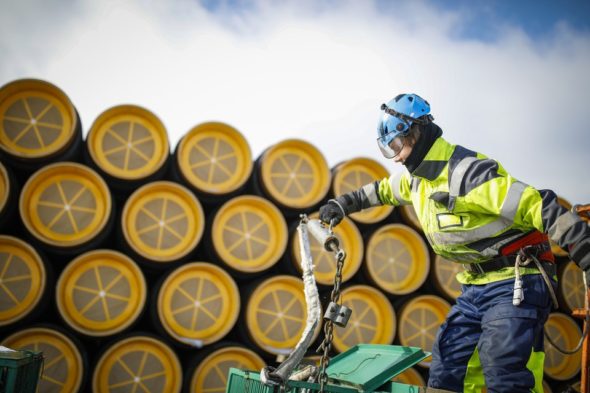The growing demand for gas will force Poles to reach for additional gas from Germany. While it will be difficult to single out the molecules from Nord Stream 2, no contract with a subsidiary of Gazprom should be signed – writes Wojciech Jakóbik, editor-in-chief BiznesAlert.pl.
Poles will need additional gas from imports to facilitate the energy transition in the 2020s. One of the sources is the reverse flow on the Yamal gas pipeline. However, it is not known whether PGNiG will sign a forward contract, or stick to the current spot deliveries. I asked Paweł Majewski, the CEO of PGNiG, about this during a panel at the Economic Forum in Karpacz, which I had the honor to host. „It should be remembered that it would still be Russian gas, just not delivered on the basis of the Yamal contract,” Majewski said. He couldn’t reveal more because of trade secrets.
I’ve written in the past that the growing demand for gas in Poland will mean that in 2023, after the Yamal contract with Gazprom ends, the country will need an additional 2.1-3.8 billion cubic meters. Part of this volume may come from the reverse flow on the Yamal pipeline. This would not be a revolutionary development, because PGNiG already imports about 2 billion cubic meters from the German stock exchange through spot purchases. Those purchases, apart from the current period that is plagued by record prices, have been cheaper than the gas delivered by Gazprom on the basis of the long term Yamal agreement. It is possible to increase purchases from that direction. Already, molecules from Nord Stream 1 are likely to be found in the gas shipments received by PGNiG without a commercial relationship with Gazprom. It would be similar in the future with gas from Nord Stream 2.
It would be indeed a revolution if an agreement was signed with a German company. A short-term contract for a small volume could be economically attractive, provided that it would not be concluded with Gazprom or an entity in any way related to this company, for example a customer of Nord Stream 2. This risk is exacerbated by the fact that there is a possibility that this disputed gas pipeline will already be operational in 2023, and Russia’s partners will try to make up for the investments in financing this venture with the help of attractive prices for the gas from Russia. They will thus be able to offer low contract prices, which may, but need not be, competitive as opposed to offers on the exchange or other contracts, such as the Norwegian ones.
Gazprom can influence this situation just like it is doing now, by reducing the supply by emptying western European warehouses. This adds to an additional price increase, which lets them flaunt Nord Stream 2 as the only solution to the problem. „This is a game on the part of the supplier (Gazprom – ed.), which aims to put pressure on Nord Stream 2 and the certification process. Our storage facilities allow us to secure supplies,” Majewski said in Karpacz. A PGNiG contract with a Gazprom subsidiary in Germany would mean the risk of being exposed to similar machinations in the future. Therefore, further spot purchases or a contract with a company independent of the Russians is the best guarantee that the increased gas demand in Poland will be covered in a safe manner and in accordance with the diversification policy.









